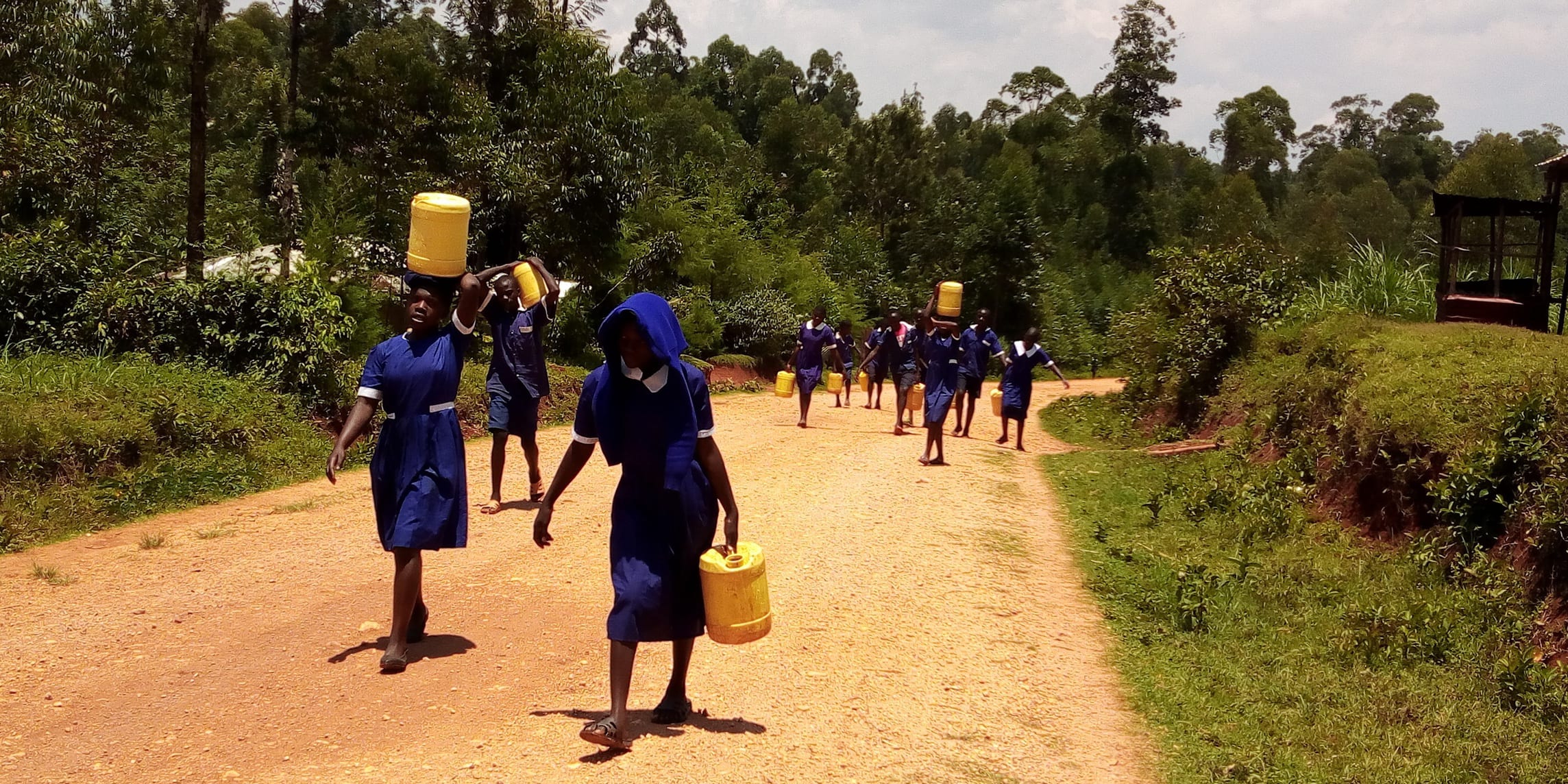Demesi Primary School is a very old school that started in 1930. It has grown slowly and steadily over the years to currently have a student population of 391 with 17 teachers and staff. These students have a huge campus; their playing field is so big that the Mbale rugby team comes to practice in the evenings and on the weekends here.
Children who attend Demesi Primary report to school by 7:00 am with water in their small yellow containers. They spend 30 minutes sweeping and cleaning up litter before morning announcements. Normal lessons begin at 8:00 am and last until lunchtime. Lunch is eaten at the school, an idea that was birthed by the head teacher after he realized that some students do not get fed when they are sent home for lunch. Afternoon lessons go from 2:00 pm until 4:00 pm when they take 30 minutes for recess.
But this normal schedule is often interrupted because students are removed from class and sent to fetch water from a community spring anytime the water they carried in the morning runs out.
The path to the spring gets very slippery when it rains, and some students fall and dirty their school uniforms. More importantly, they are at risk of getting hurt. Though water at the spring is sufficient, students often have to line up when they find many people already there fetching water. The spring is far from school so students can never seem to fetch enough for school use.

The parents worked hard to gather funds to buy plastic storage tanks to catch water in the hopes of cutting back on their children's trips to the spring. However, these add up to only a few thousand liters and do not last long without daily rain.
The head teacher explained that the latrines are always dirty and classrooms are not cleaned as frequently as she would like due to lack of enough water. She also explained that students do not wash their hands after using the latrines, which leads to diarrhea issues. Money and time are wasted when they return home looking for treatment.
"We just survive by sheer luck. The hygiene standards in this environment are very poor and dangerous for human lives. A lot has to be done to ensure our student's safety," said Teacher Otwere.
Students waste a lot of time when they go to the spring, which has dragged down academic performance as students get so tired out from the walk. Not having enough water affects their lives in so many ways, and makes students dread coming to school every day.
"Our students here suffer from diarrheal diseases which I believe are caused by the dirty water they drink from the river. That effects negatively on their performance," said Area Assistant Chief Barusi.
What we can do:
Rain Tank
A 50,000-liter rainwater catchment tank will help alleviate the water crisis at this school and is a great solution because of the high rainfall in the area. The school will help gather the needed materials such as sand, rocks, and water for mixing cement. We will deliver the hardware, lumber, guttering, cement, and expertise needed to get the job done.
Once finished, this tank can begin catching rainfall that will be used strictly by the school's students. The administration has decided to keep on using the plastic tanks to make it easier for them to manage this precious resource.
We and the school strongly believe that with this assistance, standards will significantly improve leading to better academic performance.
Handwashing Stations
There is currently nowhere for students to wash their hands after using the latrines or before eating lunch, let alone the water to do so.
The student health club will oversee the 2 new handwashing stations we will provide, and make sure they are kept clean and in working condition. The club leaders will fill the handwashing stations with water daily and m
2 triple-door latrine blocks will be constructed with local materials that the school will help gather. 3 doors will serve the girls while the other 3 will serve the boys. All of these new latrines will have cement floors that are designed to be easy to use and to clean. And with a rain tank right on school property, there should be enough water to keep them clean.
Training
We will hold a 1-day intensive training on improved hygiene, health, and sanitation habits at this school. Our team of facilitators will use a variety of methods to train students and staff, including participatory hygiene and sanitation transformation (PHAST) and asset-based community development (ABCD). We will initiate a child-to-child (CTC) student health club, which will prepare students to lead other pupils into healthy habits at school and at home. We will also lead lectures, group discussions, and provide illustrative handouts to teach health topics and ways to promote good hygiene practices within the school. We will then conduct a series of follow-up trainings before transitioning to our regularly scheduled support visits throughout the year.

 Rainwater Catchment
Rainwater Catchment
 Rehabilitation Project
Rehabilitation Project





































